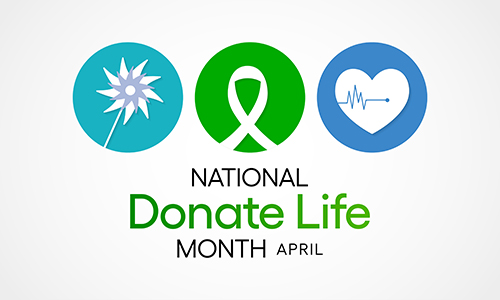Did you know: More than 100,000 people are waiting for a lifesaving transplant, according to Donate Life America? With spring in full bloom, it brings with it a renewed sense of hope, making it the perfect time to register to be an organ donor. As April is National Donate Life Month, you can offer the gift of life, and even encourage others to register as an organ, eye, and tissue donor, while also taking this time to honor those that have saved lives through their gift of donation.
We know the topic of organ donation can be a difficult one (both emotionally and spiritually). To make it even harder, there are many misconceptions out there about becoming an organ donor. In an effort to help you make the most informed decision possible, we are debunking myths, hopefully clearing up some confusion.
MYTH: Medical staff won’t try as hard to save my life if they know I’m an organ donor.
FACT: Medical staff is required to perform all life-saving procedures & they can. They have ethical and professional duties/reasons for trying to save your life. Organ donation is not even considered until all avenues of life saving measures have been exhausted.
MYTH: My religion won’t support organ donation.
FACT: All major religions in the U.S. either support organ, eye, and tissue donation, or leave it up to a person to decide. Religions often view organ donation as a final act of love and generosity. If you are still unsure, reach out to your spiritual leader to discuss the subject.
MYTH: I want to have an open-casket funeral, which won’t be possible with organ and tissue donation.
FACT: Donors are treated with the utmost respect. Open casket funerals are often still possible and even very common after organ and tissue donation.
CONCERN: I’m ok with organ donation, but not tissue donation so I don’t want to register (or vice versa).
FACT: When you register at the DMV, you are registering for both organs and tissues. You cannot select either one or the other. If this concerns you, visit registerme.org to select which organs and tissues you want to have donated.
CONCERN: I don’t want my family to incur additional medical expenses.
FACT: Families do not incur the costs associated with donated tissues or organs once the authorization has been provided, either first-person (by the donors themselves by previously registering), or from the family. Medical expenses incurred thereafter become the responsibility of the organ procurement organization.
MYTH: Wealthy people or those with celebrity status get priority on the waiting list.
FACT: The organ & tissue waiting list is the same for everybody, regardless of wealth or status. Factors that determine who will receive an organ depend on the donor’s body size, blood type, and proximity to the recipient; as well as, how sick the person is and the length of time on the waiting list.
MYTH: I can’t be an organ/tissue donor because I’m too old/too sick.
FACT: Anyone, regardless of age or medical condition, can be an organ/tissue donor.
MYTH: I’m automatically registered as an organ and tissue donor when I get my driver’s license.
FACT: No one is automatically registered to be a donor. While you may be asked at the DMV on your questionnaire if you would like to be a donor, you are not a donor until you check YES on that questionnaire. Check your driver’s license and look for the little red heart to see if you are currently registered.
Once you become an organ donor you can save up to eight lives with your donation. Go to registerme.org to learn more about Organ Donor Month and to register to become an organ donor.







